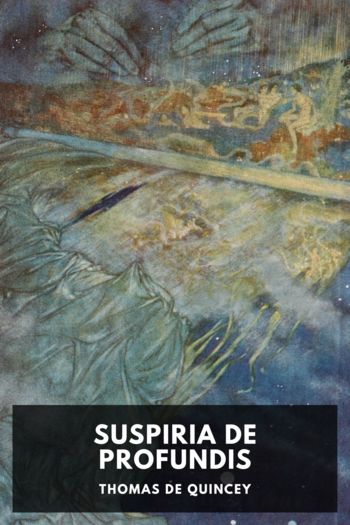Confessions of an English Opium-Eater, Thomas De Quincey [best books for students to read TXT] 📗

- Author: Thomas De Quincey
Book online «Confessions of an English Opium-Eater, Thomas De Quincey [best books for students to read TXT] 📗». Author Thomas De Quincey
That those eat now who never ate before;
And those who always ate, now eat the more.
Indeed, the fascinating powers of opium are admitted even by medical writers, who are its greatest enemies. Thus, for instance, Awsiter, apothecary to Greenwich Hospital, in his “Essay on the Effects of Opium” (published in the year 1763), when attempting to explain why Mead had not been sufficiently explicit on the properties, counteragents, etc., of this drug, expresses himself in the following mysterious terms (φωναντα συνετοισι): “Perhaps he thought the subject of too delicate a nature to be made common; and as many people might then indiscriminately use it, it would take from that necessary fear and caution which should prevent their experiencing the extensive power of this drug, for there are many properties in it, if universally known, that would habituate the use, and make it more in request with us than with Turks themselves; the result of which knowledge,” he adds, “must prove a general misfortune.” In the necessity of this conclusion I do not altogether concur; but upon that point I shall have occasion to speak at the close of my Confessions, where I shall present the reader with the moral of my narrative.
Confessions of an English Opium-Eater Being an Extract from the Life of a Scholar Preliminary ConfessionsThese preliminary confessions, or introductory narrative of the youthful adventures which laid the foundation of the writer’s habit of opium-eating in after-life, it has been judged proper to premise, for three several reasons:
As forestalling that question, and giving it a satisfactory answer, which else would painfully obtrude itself in the course of the Opium Confessions—“How came any reasonable being to subject himself to such a yoke of misery; voluntarily to incur a captivity so servile, and knowingly to fetter himself with such a sevenfold chain?”—a question which, if not somewhere plausibly resolved, could hardly fail, by the indignation which it would be apt to raise as against an act of wanton folly, to interfere with that degree of sympathy which is necessary in any case to an author’s purposes.
As furnishing a key to some parts of that tremendous scenery which afterwards peopled the dreams of the Opium-eater.
As creating some previous interest of a personal sort in the confessing subject, apart from the matter of the confessions, which cannot fail to render the confessions themselves more interesting. If a man “whose talk is of oxen” should become an opium-eater, the probability is that (if he is not too dull to dream at all) he will dream about oxen; whereas, in the case before him, the reader will find that the Opium-eater boasteth himself to be a philosopher; and accordingly, that the phantasmagoria of his dreams (waking or sleeping, daydreams or night-dreams) is suitable to one who in that character
Humani nihil a se alienum putat.
For amongst the conditions which he deems indispensable to the sustaining of any claim to the title of philosopher is not merely the possession of a superb intellect in its analytic functions (in which part of the pretensions, however, England can for some generations show but few claimants; at least, he is not aware of any known candidate for this honour who can be styled emphatically a subtle thinker, with the exception of Samuel Taylor Coleridge, and in a narrower department of thought with the recent illustrious exception2 of David Ricardo) but also on such a constitution of the moral faculties as shall give him an inner eye and power of intuition for the vision and the mysteries of our human nature: that constitution of faculties, in short, which (amongst all the generations of men that from the beginning of time have





Comments (0)